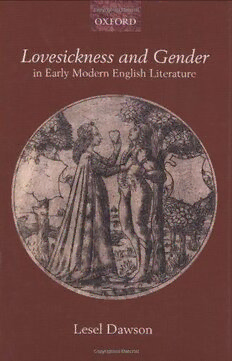Download Lovesickness and Gender in Early Modern English Literature PDF Free - Full Version
Download Lovesickness and Gender in Early Modern English Literature by Lesel Dawson in PDF format completely FREE. No registration required, no payment needed. Get instant access to this valuable resource on PDFdrive.to!
About Lovesickness and Gender in Early Modern English Literature
In early modern medical texts, intense unfulfilled erotic desire is held to be a real and virulent disease: it is classified as a species of melancholy, with physical etiologies and cures. Lesel Dawson analyzes literary representations of lovesickness in relation to medical ideas about desire and wider questions about gender and identity, exploring the different ways that desire is believed to take root in the body, how gender roles are encoded and contested in courtship, and the psychic pains and pleasures of frustrated passion. She explores the relationship between women's lovesickness and other female maladies (such as hysteria and greensickness), and asks whether women can suffer from intellectual forms of melancholy generally thought to be exclusively male. Finally, she examines the ways in which Neoplatonism offers an alternative construction of love to that found in natural philosophy and considers how anxieties concerning love's ability to emasculate the male lover emerge indirectly in remedies for lovesickness. With reference to the works of Shakespeare, Beaumont and Fletcher, Middleton, Ford, and Davenant, Lovesickness and Gender in Early Modern English Literature investigates how early modern representations of lovesickness expose contemporary cultural constructions of love, revealing the relation of sexuality to spirituality and the creation and shattering of the impassioned subject. It offers an important contribution to the history of romantic love and will be of interest to students and scholars of literature, gender, and medical history.
Detailed Information
| Author: | Lesel Dawson |
|---|---|
| Publication Year: | 2008 |
| ISBN: | 9780191556098 |
| Pages: | 255 |
| Language: | English |
| File Size: | 1.538 |
| Format: | |
| Price: | FREE |
Safe & Secure Download - No registration required
Why Choose PDFdrive for Your Free Lovesickness and Gender in Early Modern English Literature Download?
- 100% Free: No hidden fees or subscriptions required for one book every day.
- No Registration: Immediate access is available without creating accounts for one book every day.
- Safe and Secure: Clean downloads without malware or viruses
- Multiple Formats: PDF, MOBI, Mpub,... optimized for all devices
- Educational Resource: Supporting knowledge sharing and learning
Frequently Asked Questions
Is it really free to download Lovesickness and Gender in Early Modern English Literature PDF?
Yes, on https://PDFdrive.to you can download Lovesickness and Gender in Early Modern English Literature by Lesel Dawson completely free. We don't require any payment, subscription, or registration to access this PDF file. For 3 books every day.
How can I read Lovesickness and Gender in Early Modern English Literature on my mobile device?
After downloading Lovesickness and Gender in Early Modern English Literature PDF, you can open it with any PDF reader app on your phone or tablet. We recommend using Adobe Acrobat Reader, Apple Books, or Google Play Books for the best reading experience.
Is this the full version of Lovesickness and Gender in Early Modern English Literature?
Yes, this is the complete PDF version of Lovesickness and Gender in Early Modern English Literature by Lesel Dawson. You will be able to read the entire content as in the printed version without missing any pages.
Is it legal to download Lovesickness and Gender in Early Modern English Literature PDF for free?
https://PDFdrive.to provides links to free educational resources available online. We do not store any files on our servers. Please be aware of copyright laws in your country before downloading.
The materials shared are intended for research, educational, and personal use in accordance with fair use principles.

